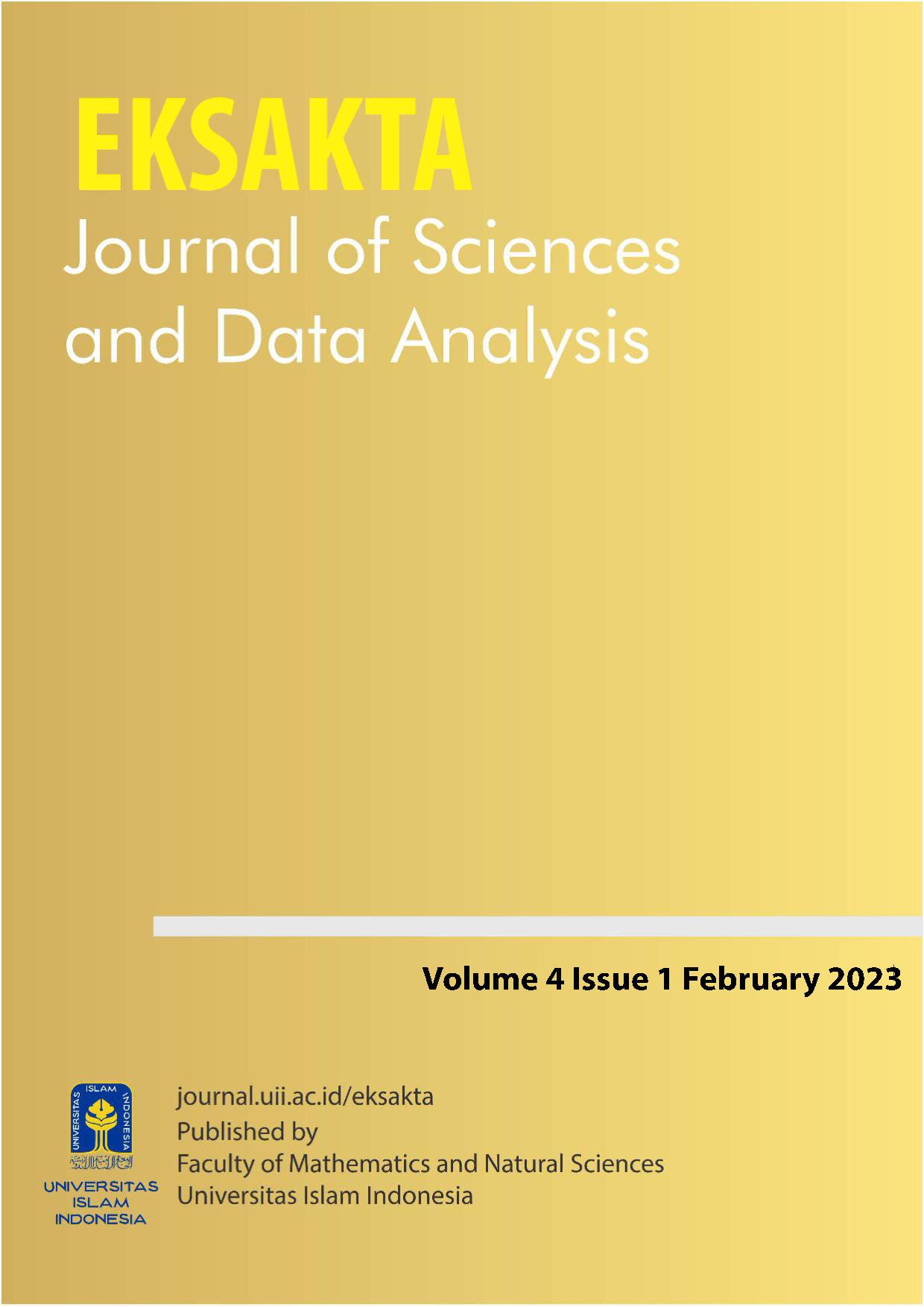Main Article Content
Abstract
Economic resilience is certainly an important target in every country or region. One of the main concerns in the economy of a country is poverty. This study aims to explore data with panel data regression that was formed and find factors that affect poverty in Bengkulu province from 2017 to 2020. The secondary data utilized were obtained from the Central Bureau of Statistics (BPS) of the province of Bengkulu. The independent variables used are Gross Regional Domestic Product (GRDP), Human Development Index (HDI), Life Expectancy (LE), and Average Years of Schooling (AYS), while the dependent variable is the percentage of poverty in the form of per region. The best panel data model obtained is the Fixed Effect Model (FEM) model with a cross-section. Based on the results obtained, the significant variable in this model is the GRDP variable. From the prediction results, the values obtained from Mean Absolute Percentage Error (MAPE), Mean Square Error (MSE), and Root Mean Square Error (RMSE) respectively are 6.59% for MAPE, 5.48 for MSE, and 2.4 for RMSE indicating that panel data analysis is very very good in terms of predicting poverty in Bengkulu province
Keywords
Article Details
Authors who publish with this journal agree to the following terms:
- Authors retain copyright and grant the journal right of first publication with the work simultaneously licensed under a Creative Commons Attribution License that allows others to share the work with an acknowledgment of the work's authorship and initial publication in this journal.
- Authors are able to enter into separate, additional contractual arrangements for the non-exclusive distribution of the journal's published version of the work (e.g., post it to an institutional repository or publish it in a book), with an acknowledgment of its initial publication in this journal.
- Authors are permitted and encouraged to post their work online (e.g., in institutional repositories or on their website) prior to and during the submission process, as it can lead to productive exchanges, as well as earlier and greater citation of published work (See The Effect of Open Access).
References
- N. Liao and Y. He, Exploring the effects of influencing factors on energy efficiency in industrial sector using cluster analysis and panel regression model, Energy, 158 (2018) 782–795.
- D. N. Gujarati and D. C. Porter, Basic Econometric. New York: McGraw-Hill Education, 2008.
- A. Indrasetianingsih and T. K. Wasik, Model regresi data panel untuk mengetahui faktor yang mempengaruhi tingkat kemiskinan di pulau Madura, J. Gaussian, 9(3) (2020) 355–363.
- N. Aulina and Mirtawati, Analisis regresi data panel pada faktor-faktor yang mempengaruhi kemiskinan di Indonesia tahun 2015 – 2019, KINERJA J. Ekon. dan Bisnis, 4(1) (2021) 78–90.
- Hartomo and A. Aziz, Ilmu sosial dasar. Jakarta: Bumi Aksara, 2004.
- A. M. Astuti, Fixed effect model pada regresi data panel, Beta, 3(2) (2010) 134–145.
- D. Hanum, Studi tentang SUR untuk Data Panel dengan Model Gravitasi, Insititut Teknologi Sepuluh November, 2014.
- W. H. Greene, Econometric Analysis: Global Edition. 2020.
- P. R. Sihombing, Analisis regresi data panel brganda, in Statistik Multivariat dalam riset, Widina, (2021) 95–112.
- B. H. Baltagi, Econometrics, 6th ed. New York: Springer International Publishing, 2021.
- D. Rosadi, Analisis ekonometrika & runtun waktu terapan dengan R: aplikasi untuk bidang ekonomi, bisnis, dan keuangan. Yogyakarta: Gadjah Mada University Press, 2011.
- D. S. K. Karunasingha, Root mean square error or mean absolute error? Use their ratio as well, Inf. Sci. (Ny)., 585 (2022) 609–629.
- D. Chicco, M. J. Warrens, and G. Jurman, The coefficient of determination R-squared is more informative than SMAPE, MAE, MAPE, MSE and RMSE in regression analysis evaluation, PeerJ Comput. Sci., 7 (2021) 1–24.
- S. Kim and H. Kim, A new metric of absolute percentage error for intermittent demand forecasts, Int. J. Forecast., 32(3) (2016) 669–679.
- C. Chatfield, Time series-Forecasting, 1st ed., no. 1. United Kindom, 2000.
References
N. Liao and Y. He, Exploring the effects of influencing factors on energy efficiency in industrial sector using cluster analysis and panel regression model, Energy, 158 (2018) 782–795.
D. N. Gujarati and D. C. Porter, Basic Econometric. New York: McGraw-Hill Education, 2008.
A. Indrasetianingsih and T. K. Wasik, Model regresi data panel untuk mengetahui faktor yang mempengaruhi tingkat kemiskinan di pulau Madura, J. Gaussian, 9(3) (2020) 355–363.
N. Aulina and Mirtawati, Analisis regresi data panel pada faktor-faktor yang mempengaruhi kemiskinan di Indonesia tahun 2015 – 2019, KINERJA J. Ekon. dan Bisnis, 4(1) (2021) 78–90.
Hartomo and A. Aziz, Ilmu sosial dasar. Jakarta: Bumi Aksara, 2004.
A. M. Astuti, Fixed effect model pada regresi data panel, Beta, 3(2) (2010) 134–145.
D. Hanum, Studi tentang SUR untuk Data Panel dengan Model Gravitasi, Insititut Teknologi Sepuluh November, 2014.
W. H. Greene, Econometric Analysis: Global Edition. 2020.
P. R. Sihombing, Analisis regresi data panel brganda, in Statistik Multivariat dalam riset, Widina, (2021) 95–112.
B. H. Baltagi, Econometrics, 6th ed. New York: Springer International Publishing, 2021.
D. Rosadi, Analisis ekonometrika & runtun waktu terapan dengan R: aplikasi untuk bidang ekonomi, bisnis, dan keuangan. Yogyakarta: Gadjah Mada University Press, 2011.
D. S. K. Karunasingha, Root mean square error or mean absolute error? Use their ratio as well, Inf. Sci. (Ny)., 585 (2022) 609–629.
D. Chicco, M. J. Warrens, and G. Jurman, The coefficient of determination R-squared is more informative than SMAPE, MAE, MAPE, MSE and RMSE in regression analysis evaluation, PeerJ Comput. Sci., 7 (2021) 1–24.
S. Kim and H. Kim, A new metric of absolute percentage error for intermittent demand forecasts, Int. J. Forecast., 32(3) (2016) 669–679.
C. Chatfield, Time series-Forecasting, 1st ed., no. 1. United Kindom, 2000.




